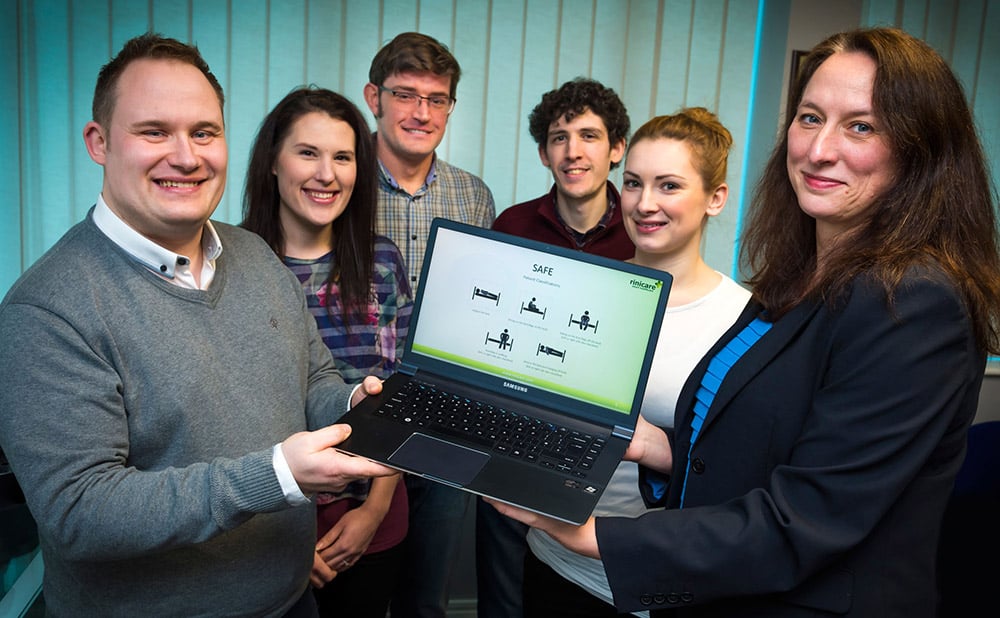New technology to stop falls from beds
“All the ideas that the SBRI Healthcare are supporting will hopefully help patients in the future with a range of issues including falls, incontinence and mobility.”
A Lancashire company has been awarded nearly £100,000 to develop a system to prevent older patients falling from their beds.
Rinicare Ltd has received £99,694 through the Small Business Research Initiative for Healthcare (SBRI Healthcare). The company is developing a system to avoid falls that combines a thermal imaging sensor and bespoke algorithms on a computer to detect changes in a patient’s position in a hospital-style bed. It will send early warning messages to clinicians so action can be taken to prevent a fall.
Falls are the number one hastening factor for a person losing independence and going into long-term care, so the system could have a huge impact on people’s lives.
The number of attendances at A&E has risen significantly in the last decade, putting pressure on urgent and emergency care services and increasing waiting times. 21.7 million people visited A&E in the last year*, a greater than 30 per cent rise in the last decade. More than 70 per cent of hospital bed days are occupied by A&E admissions and 80 per cent of A&E admissions who stay for more than two weeks are patients aged over 65.
During phase one of the technology development, Rinicare will be fully supported and funded to demonstrate the technical feasibility of their proposed concept for a six-month developmental stage. If found to offer value and technical feasibility, the Rinicare system will progress to phase two where it will be supported to take the scheme through to commercialisation.
Rinicare will develop SAFE in cooperation with The University of Manchester and The University Hospital of South Manchester. Professor Chris Todd, from the University of Manchester, said: “There are more than 200,000 falls in NHS acute hospitals every year. Patients over 65 admitted for medical and surgical treatments are at increased risk of falling while in hospital.
“We are collaborating with Rinicare, which is developing this device, because we hope it will help NHS staff to monitor patients’ risk as it changes and alert staff to intervene to prevent falls.
“Hospital falls cost the NHS a huge amount of money (£18m+) each year that could be used elsewhere if the fall hadn’t happened. But, perhaps even more importantly, falls cause patients physical harm, as well as the mental anguish they and their families experience when this happens in hospital; a place which is meant to be safe.”
Lorna Green, Commercial Director at the North West Coast Academic Heath Science Network which assisted with the competition, said: “We are pleased to see Rinicare stepping forward with an innovative idea to address one of the biggest challenges that the NHS faces at the moment – supporting older people who are living longer but with a range of chronic conditions.
“All the ideas that the SBRI Healthcare are supporting will hopefully help patients in the future with a range of issues including falls, incontinence and mobility.”
The Small Business Research Initiative for Healthcare (SBRI Healthcare) is part of an NHS England initiative to develop products that address unmet health needs and explores the feasibility of new products and innovations which ease the pressure on urgent and emergency care services.
Rinicare is one of 11 small businesses in England that will benefit from funding to address challenges in older people in the priority problem areas of falls, incontinence and decline in functional ability in order to accelerate the development and NHS adoption of new technologies.
Karen Livingstone, Director of SBRI Healthcare, said: “We are particularly pleased to have been able to support so many innovative companies given the financial pressures on the NHS. In 2015 the programme has awarded 28 contracts across the various phases of the competition, awarding £15m to 26 companies addressing known healthcare challenges. We are excited for 2016 with the launch of new competition rounds, funding for the next phase of current competitions and seeing more SBRI Healthcare supported technologies reaching patients.”
SBRI Healthcare competition theme areas are chosen in partnership with the Academic Health Science Networks (AHSNs) across England. Previous SBRI Healthcare competitions have called for technological and innovative solutions, for example to change people’s behaviour to reduce the impact of obesity and alcohol related diseases; how to live well with dementia and improved medicine management.
To find out more visit www.sbrihealthcare.co.uk
*Kings Fund 2013/14 figures


